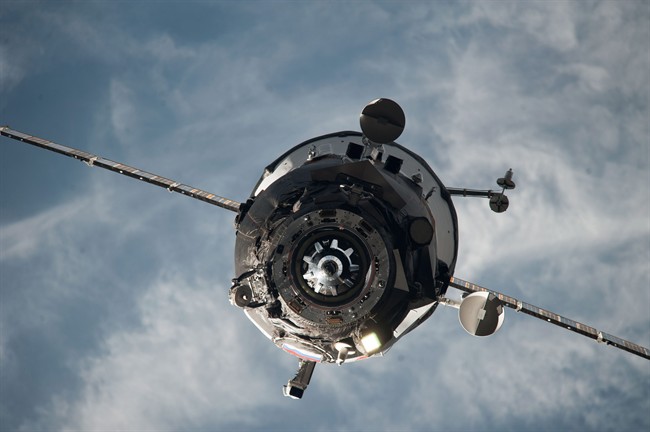TORONTO – The Russian spaceship that failed to deliver its cargo to the International Space Station at the end of April will reach a fiery demise tonight, according to the Russian Space Agency, Roscosmos. But they’re still uncertain where.

READ MORE: Problems delay docking of Russian cargo ship to space station
Roscosmos reported on Thursday that the Progress M-27M cargo ship will burn up sometime between 1:13 a.m. to 4:51 a.m on May 8, Moscow Standard Time. That would be between 6:13 p.m. and 9:51 p.m. ET May 7 (3:13 p.m. to 6:51 p.m. PT).
After the spacecraft launched on April 28, Russian ground controllers were unable to communicate with it. They tried for two days, but failed to gain any control of the craft that was spinning out of control. The ship contained about 6,000 pounds of food, fuel and supplies for the six astronauts on board the space station.
Though the mission failed, the astronauts have enough supplies to last them until the next scheduled SpaceX delivery scheduled for June 19.

Get breaking National news
READ MORE: SpaceX crew abort system test a success
The next Progress launch is scheduled for Aug. 6.
Though most of Progress will burn up in the atmosphere, there is a chance that larger parts could reach Earth’s surface.
The European Space Agency reported on Thursday that the reentry over North America or Europe has “dropped significantly,” though it did not say where it might burn up. Initial estimates put the range between 51 degrees north latitude and 51 degrees south. The space agency also said that current estimates data suggest that Progress is rotating once every 1.8 seconds.
It may seem like a scary thought to have something enter Earth’s atmosphere uncontrolled, but since the space program began in 1957, no one has ever been injured or killed by falling space debris. That’s likely because most of our planet is water and large parts are of the world are uninhabited.


Comments